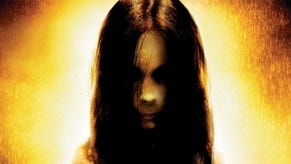Eternal Darkness: Sanity's Requiem
Losing your mind? Buy this
Have you ever been frightened by a videogame? Probably not. You could say that something like Resident Evil scares you, as a zombie lunges out of nothing and you leap from your seat in the darkness, but through its haunting narrative and the developer's skilful use of 'sanity effects', Eternal Darkness has the power to actually frighten you, and that's an important distinction.
Some of the things Silicon Knights will do to you during their 15 hours will actually haunt you. Some of the fates that befall the 12 characters you control will have you tearing your hair out, writhing in confusion, and wondering where the line falls between what's actually happening and what the game is manifesting to spook you.
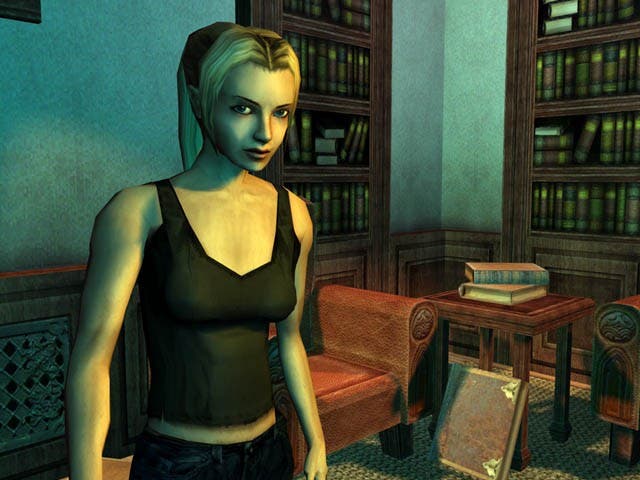
No limping corpses
Eternal Darkness is definitely a different kind of survival horror game. The challenge isn't marshalling your inventory, storing things strategically in lockboxes and fighting for the right to save your game, whilst gradually clawing your way through hordes of the undead. Although the game's setting is a mansion, the spirits and evil that lurk within aren't going to come limping toward you with their arms outstretched.
Your host for this mansion tour is one Alex Roivas. Having been summoned to her grandfather's secluded home in Rhode Island, she is shown the decapitated, mutilated corpse of her relative and makes an ill-conceived pledge to find the culprit. As the local law enforcement stands mystified, she combs the depths of the Roivas mansion in search of clues. And in the recesses of the library, she finds one - the Tome of Eternal Darkness.
Reading chapters from this grim, Evil Dead-esque relic constructed of flesh, sinew and bone will send you back through time, transplanting the player into the shoes of whichever poor unfortunate found their fate ingrained in this otherworldly Tome. As Alex reads, more of the story is told in Roivas senior's voice, as you act out the words on the page in the role first of the Centurion Pious Augustus, as he wanders the darkness of a Persian labyrinth, and later the archaeologist dusting cobwebs from inscriptions and the Franciscan monk trying to prove his innocence, in locations as far afield as a Cambodian temple.
These unfortunate subjects of Eternal Darkness work in a grizzlier environment than young Alex, though she too will soon find a blade and defend herself. Pious, like Alex, is a noble construction. Neither the game engine's characters nor its environments are as finely detailed as Resident Evil's, but neither tries to compete like for like.
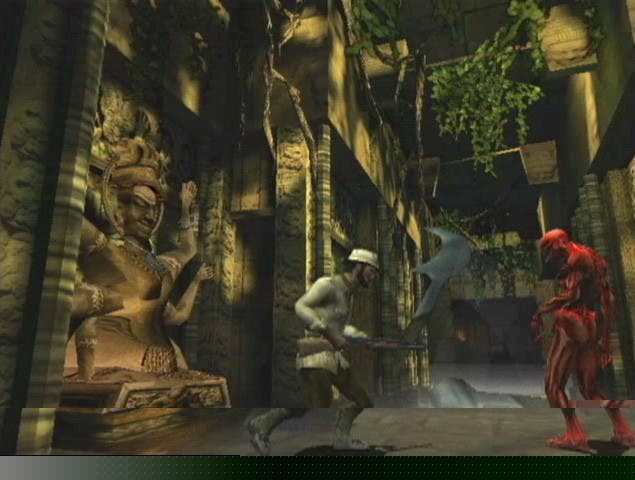
Believable surroundings
Rooms are meant to be ornately decorated, but there's far more definition than elsewhere - whereas in Resi you spent a lot of the time scouring your photographic surroundings for glinting clues, in Eternal Darkness, there is enough detail to have you believe - books lie strewn in wonky piles on desks, pictures hang from every wall for you to examine (and often you have no handy text-based scrawl to explain them), and torches line tombs, occasionally spitting flames to make you jump as you tiptoe along watching for your next adversary.
Characters like Pious are given greater body through individual eye movement, craning their necks to examine things and other hunching before they lunge to attack, not to mention the clinking and clomping of their chainmail and armour which can obscure the noise of approaching death...
Decent voice acting? In a game? Who'd have thought it?
What's more, the voice acting is in a class of its own - though Western games often suffer from badly disjointed dialogue, Eternal Darkness suspends your disbelief that bit longer by sustaining a high quality of commentary from Roivas and dialogue from the rest of the cast. Elsewhere on the audio/visual front, the use of lighting is the best we've seen in a survival horror game. Having Alex peer up from a table and the light gradually fill the contours of her face and body, as shadows fall across her and her eyes stare worriedly - it adds so much more realism than a million painstakingly constructed photographic backgrounds ever could.
Back to the game itself though, and main tenets of your progression through the book are exploration of the house, puzzle-solving and undead combat. You'll complete chapters as you unlock more of the house - this is mostly a process of using clues and items you've picked up thoughtfully, and although the puzzles are rarely mindbendingly difficult, nothing in ED is ever simple. Find the second floor key, for instance, and you'll also find that it breaks in the lock. Find a telescope in a room just off from the library, and you'll also find that you can't just pop your eye to the lens.
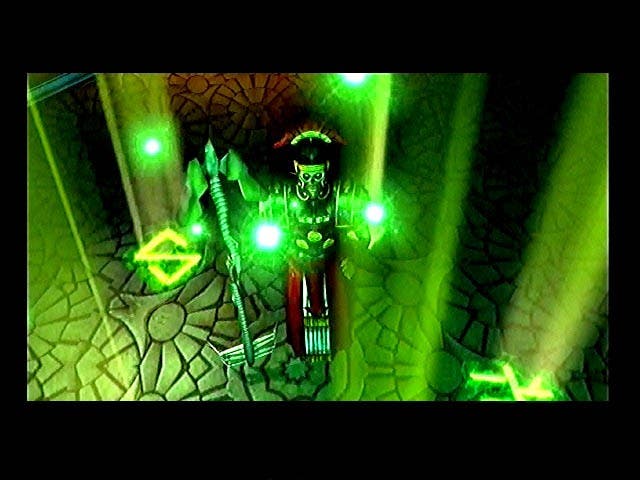
Hack, and indeed, slash
Fighting the legions of the undead, who seem quite upset about your dabbling in their masters' affairs, is a process of aiming for a body part and then hacking away with whatever you have. At first. Pious, for example, has a short, sharp Roman sword. By tugging on the R button in the presence of an enemy, that enemy's upper torso will flash white, indicating where any blow struck with A will land. By tapping R again you cycle enemies. By holding forward, back, left or right you can target an individual body part - you'll want to remember 'up' for head. Once decapitated or slashed enough to be downtrodden, the game prompts you to finish an enemy with a grizzly B button blow, often celebrated by a close-up camera angle.
As you progress though, you can learn to harness the complicated magic system. Each spell is made up of symbols called runes, which you'll see throughout the game. By combining them, it's possible to cast greater and greater spells. Spells are stored in the Tome of Eternal Darkness. The best thing about the spell system though is that you can roll your own - pop into the options menu and choose New Spell and you can choose its alignment and a combination of runes (you'll find scrolls and parchments on your travels which give you an idea of what to mix). Once concocted, you can cast spells in-game to vanquish wards which impede your progress, protect yourself from lethal blows and even to summon companion creatures. You can even increase the potency of your arsenal by creating spells to enchant items.
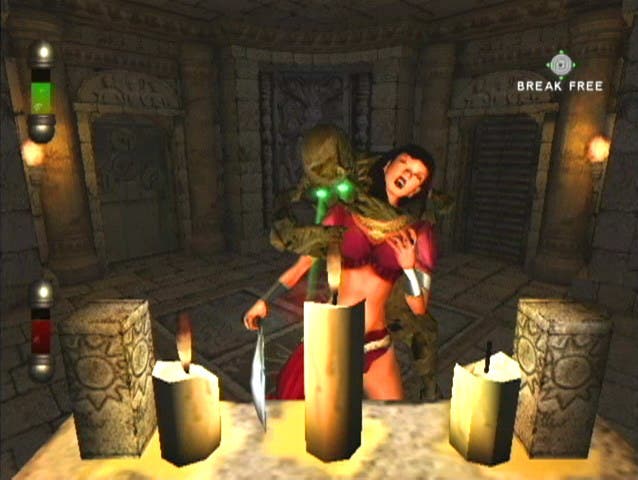
Insane in the membrane
The thing you most want to hear about though is the sanity meter. On the whole, spells, weapons and sanity aside, Eternal Darkness is a fairly standard story told in an adventurous way, combining the tales of many people into one big, long yarn. What gives it that edge is the sanity meter. As unspeakable abominations hurtle forth, you gradually lose your mental grip. Lose enough of it and you'll start to hallucinate, and it makes progression that bit more difficult. Enter a new room and you may find yourself completely unarmed. Go out and come back in again and your weapons are at your side - did you imagine it? Waltz into the midst of hordes of enemies hoping to cause some damage, and the Cube complains that a controller is not inserted in port one! What the motionless hell do you do?
At the end of the day, there are only three things about Eternal Darkness we can fault. Three. And none of them should stop you buying this game. Firstly, we have a problem with the combat. Although the targeting system is fine, the way your character's blows often strike scenery wastefully is an unavoidable quirk, and often frustrating. Second, the camera, though eerily cinematic and often ominously placed to give you little clue as to what lies ahead, can obscure important objects and is perhaps less useful than a roving third-person approach. That said, it's not too annoying and it often heightens fear and tension.
They're coming to take me away ho ho he he ha ha
And the third thing we want to contest is the difficulty level. Well, we don't really want to contest it, but some will definitely blitz through Eternal Darkness in about 15 hours and moan, "that was too easy," and for them we must raise a hand. However, to reach the end of ED and complain is arguably to have missed the point - you should buy this game because it's frightening in a way that few games ever have been, and because it's a vividly explored, engrossing narrative the likes of which few out-and-out storytellers like Final Fantasy can compete with. Given the sheer quality of the composition and a very engrossing 15 hours of gameplay, I have to recommend this. There isn't much else like Eternal Darkness, and though it might have felt that way for a bit, I'm not losing my mind.
Eternal Darkness screenshots


